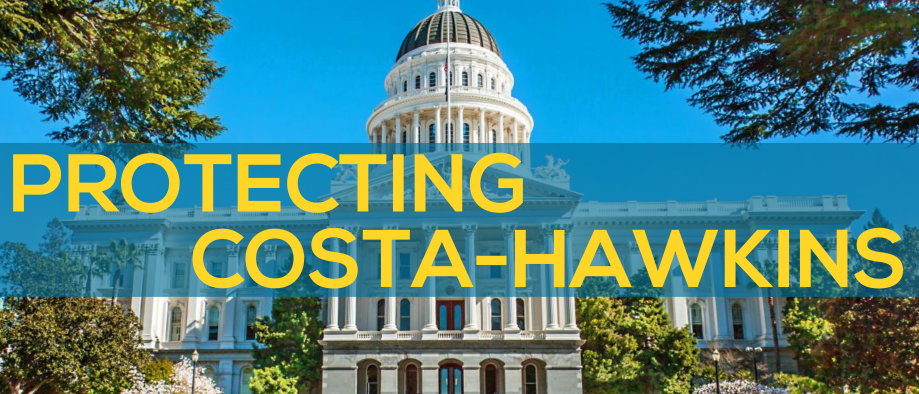
To stop the so-called "Justice for Renters" initiative in 2024, the East Bay Rental Housing Association is asking for your support. We need to fight this third attempt to repeal Costa-Hawkins, led by the same anti-housing activists of Proposition 10 and 21 from 2018 and 2020. We are helping our state affiliate, CalRHA, raise $5 million towards this campaign, so we are all in this together.
What is Costa-Hawkins?
The Costa-Hawkins Rental Housing Act is a California state law that exempts single-family homes, condominiums, and new construction built after 1995 from rent control ordinances. It also allows rental housing providers to reset the rental rate on rent-controlled units after the renters have moved out — a policy known as vacancy decontrol.
In 2019, the California legislature passed and the governor signed AB 1482, which created a statewide rent cap for the next 10 years. The Tenant Protection Act of 2019 caps annual rent increases at 5% plus regional inflation. For example, had the bill been in effect in 2019, rent increases in Los Angeles would have been capped at 8.3%, and in San Francisco at 9%. The increases are pegged to the rental rate as of March 15, 2019. The new law does not apply to buildings built within the prior 15 years, or to single-family homes (unless owned by corporations or institutional investors). It also includes a requirement to show "just cause" for evictions, and retains "vacancy decontrol", meaning that rents can increase to market rate between tenants. Many municipalities in California continue to have their own rent control laws, which remain intact under AB 1482. This ability of city governments is limited by the federal and state constitutions, as well as federal and state laws. Costa–Hawkins is one of the most prominent state statutes limiting the power of California cities to regulate their rental markets.
Efforts to Repeal Costa-Hawkins
In 2018 the Alliance of Californians for Community Empowerment (ACCE) were successful in getting a ballot measure which would repeal wholesale the 1995 Costa–Hawkins Act. It was named by its supporters as the "Affordable Housing Act". The initiative was Proposition 10 on the General Election ballot of November 2018.
A survey conducted in October 2018 found that 28% of eligible California voters believed that the lack of rent control was the main contributing factor to California's housing affordability crisis. 24% of respondents believed that the most significant cause of the housing crisis was insufficient funding of low-income housing; only 13% believed it was insufficient new housing.
On November 6, Prop 10 was decisively defeated, reported the Los Angeles Times; it endorsed the measure. The preliminary results with 100% of precincts reporting: 38% or 2,675,378 voted for, and 62% or 4,310,298 voted against.
Again in 2020, the same activists who advocated for Proposition 10 (both financially backed by the AIDS Healthcare Foundation), decided to put another initiative to amend the Costa-Hawkins Act on the ballot. This initiative, Proposition 21, was an attempt to have a more limited and partial repeal of Costa-Hawkins, as opposed to a complete repeal which was on the ballot in 2018. This measure also failed, 59.85% "no" to 40.15% "yes".
Although voters have repeatedly voted against a repeal of Costa-Hawkins, another initiative is slated to return to the ballot in 2024. This campaign, financed again by the same non-profit organization, the AIDS Healthcare Foundations, hopes that "third times a charm." The AIDS Healthcare Foundation makes millions in profits from an exclusive pharmasutical contract that allows them to purchase AIDS medication at an extreme discount and sell them at a huge mark-up. Repealing Costa-Hawkins and instituting wide rent control, is viewed by the AHF's president, Michael Weinstein, as a crucial step in ensuring access to affordable housing, regardless of the negative consequences.
Rent Control
Most economists believe rent control reduces the supply of housing over time, and students of economics are taught this analysis very early on in their instruction. Housing industry advocates rely on this analysis to justify laws like Costa-Hawkins which restrict the ability of municipalities to enact rent control. Across the US, these groups have been extremely successful in drastically limiting or completely outlawing rent control since the 1950s.
